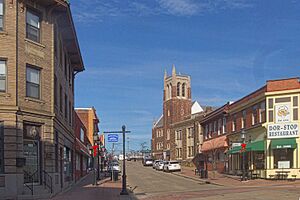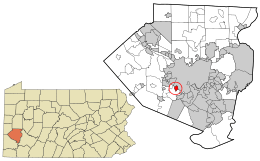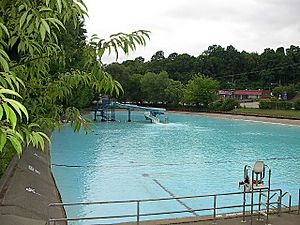Dormont, Pennsylvania facts for kids
Quick facts for kids
Dormont, Pennsylvania
|
|
|---|---|
|
Borough
|
|

Potomac Avenue, Dormont
|
|

Location in Allegheny County and the U.S. state of Pennsylvania.
|
|
| Country | United States |
| State | Pennsylvania |
| County | Allegheny |
| Government | |
| • Type | Council-Manager |
| Area | |
| • Total | 0.76 sq mi (1.97 km2) |
| • Land | 0.76 sq mi (1.97 km2) |
| • Water | 0.00 sq mi (0.00 km2) |
| Population
(2020)
|
|
| • Total | 8,244 |
| • Density | 10,847.37/sq mi (4,186.02/km2) |
| Demonym(s) | Dormonster |
| Time zone | UTC−5 (Eastern (EST)) |
| • Summer (DST) | UTC−4 (EDT) |
| ZIP Code |
15216
|
| Area code(s) | 412 |
| FIPS code | 42-19576 |
Dormont is a small town, called a borough, located in Allegheny County, Pennsylvania, United States. In 2020, about 8,244 people lived there. It's a neighborhood near the big city of Pittsburgh. The name Dormont comes from French words that mean "Mountain of Gold."
Contents
History of Dormont
Long ago, the land where Dormont is now was home to the Delaware and Shawnee Native American tribes. In 1768, the land became part of a large purchase from the Six Nations. Over time, this area was part of different counties and townships. Finally, in 1788, it became part of St. Clair Township in Allegheny County.
Dormont was officially created on March 31, 1909. It was formed from parts of Scott and Union Townships. This made Dormont the first independent town in the South Hills area of Allegheny County.
The people who founded Dormont wanted to call it "Mt. Lebanon." However, their neighbors to the south, who later became Mt. Lebanon, objected. So, they chose the name Dormont. It came from the French phrase "mont d'or," which means "Mountain of Gold."
The first local government officials were elected on April 27, 1909. Dormont grew by adding more land from nearby townships in 1909, 1913, 1916, and 1921. This made its total area just under one square mile. The town grew quickly after a streetcar tunnel and the Liberty Tunnels were built, making it easier to travel to Pittsburgh.
In June 2020, the Dormont Borough Council made a plan for the next ten years. This plan covers how land will be used, housing, transportation, and fun things like parks. The council also approved a budget of $9.8 million for 2021 without raising taxes for residents.
Geography of Dormont
Dormont is in Southwestern Pennsylvania, within Allegheny County. It is about 4 miles (6.4 km) south of Pittsburgh, which is the main city in the county. The borough covers an area of about 0.7 square miles (1.8 km2), and all of it is land.
Neighboring Communities
Dormont shares its borders with four areas. To the north, northeast, and east are the Pittsburgh neighborhoods of Banksville, Beechview, and Brookline. To the south and west, Dormont is bordered by Mt. Lebanon.
Dormont's Population
| Historical population | |||
|---|---|---|---|
| Census | Pop. | %± | |
| 1910 | 1,115 | — | |
| 1920 | 6,455 | 478.9% | |
| 1930 | 13,190 | 104.3% | |
| 1940 | 12,974 | −1.6% | |
| 1950 | 13,405 | 3.3% | |
| 1960 | 13,098 | −2.3% | |
| 1970 | 12,856 | −1.8% | |
| 1980 | 11,275 | −12.3% | |
| 1990 | 9,772 | −13.3% | |
| 2000 | 9,305 | −4.8% | |
| 2010 | 8,593 | −7.7% | |
| 2020 | 8,244 | −4.1% | |
| Sources: | |||
Based on the 2000 census, Dormont had 9,305 people living there. There were 4,089 households. About 25% of these households had children under 18. The average household had about 2.27 people.
The population included people of different ages. About 21% were under 18 years old. Around 34% were between 25 and 44 years old. The median age in Dormont was 36 years.
Arts and Culture in Dormont
Dormont offers many fun things for its residents. It has one of the largest swimming pools in Pennsylvania, covering over 60,000 square feet. There are also two parks, basketball and tennis courts, and two Little League baseball fields. The town also has a great library and a playground built by volunteers.
Many seasonal activities happen for both kids and adults. "Dormont Day" is a big event held every Fourth of July. It includes family entertainment all day, live music, food, games, and pony rides. The day ends with a spectacular fireworks show.
In the fall, Dormont hosts the Dormont Street and Music Festival. This festival features bands playing different types of music on two stages. Other events include Dormont Pride, the Dormont Ethnic Food Festival, and Dormont Multicultural Day. These events celebrate the town's diverse cultures.
Organizations like the Dormont Historical Society and the Dormont Library help promote the town's culture. The Dormont Arts & Culture Committee also works to preserve the town's history and traditions.
Education in Dormont
Since 1965, Dormont has been part of the Keystone Oaks School District. This district also includes the towns of Castle Shannon and Green Tree. Even though these towns are not connected, they share the school district.
Dormont has its own schools: Dormont Elementary School and Keystone Oaks Middle School. Keystone Oaks High School is also part of the district. Interestingly, the middle and high schools are located just outside Dormont's border, in Mt. Lebanon.
Dormont Elementary School is built on the site of the old Dormont High School. The old high school became Jay Neff Middle School in 1969. Later, in 1996, the old middle school was taken down. A new elementary school was built, bringing together students from two older schools, Kelton and Hillsdale. The old Hillsdale School building is now the Dormont Municipal Building.
Dormont is also home to the South Hills Beauty Academy and the Pittsburgh Bartending School.
Infrastructure in Dormont
Dormont has a public works department that takes care of many important services. They maintain the streets, remove snow, and collect leaves. They also handle recycling and trash collection for the community. This department helps keep Dormont running smoothly for its residents.
Notable People from Dormont
- Jeff Goldblum
- Christine Laitta
- Joe Manganiello
- Bill Mazeroski
- George A. Romero
- W. D. Snodgrass
- Gene Steratore
See also
 In Spanish: Dormont para niños
In Spanish: Dormont para niños
 | Janet Taylor Pickett |
 | Synthia Saint James |
 | Howardena Pindell |
 | Faith Ringgold |


